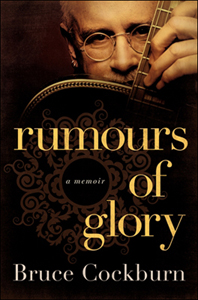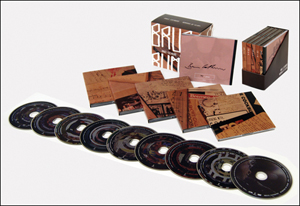
30 October 2014 - - Revered Canadian singer-songwriter-guitarist Bruce Cockburn hasn’t released an album since 2011, but he’s making up for the gap in a big way. This week he released an engrossing memoir called “Rumours of Glory,” detailing his 40-plus-year artistic career and how it intersected with his spiritual awakenings and activism. Next week, he will unleash a nine-CD box set of the same name that serves as a companion to the book.
Cockburn comes to the Somerville Theatre Saturday — a few tickets remained at press time. The concert will celebrate a career that has seen Cockburn combining folk, jazz, pop, and rock in hits like “If I Had a Rocket Launcher,” “Wondering Where the Lions Are,” and “Lovers in a Dangerous Time,” even as his humanitarian and social-justice efforts have taken him to the far corners of the globe.
We caught up with the amiable Cockburn, 69, by phone from San Francisco recently to chat about his life’s work, and wondered aloud whether we should read anything into all of this activity, as well as the 2013 release of the career-spanning documentary “Pacing the Cage.”
“I’m not retiring anytime soon,” he replied with a chuckle.
Q. Why was now the time to write “Rumours of Glory”?
A. Harper Collins came along with an offer. [Laughs.] It was not the first time that someone had had the idea. They approached me about doing a spiritual memoir, but they couldn’t quite tell me what they meant by that. But it sounded like an interesting approach to the memoir thing, and appropriate to me.

Q. Were you concurrently curating the box set?
A. The box set came after. Basically what the box set consists of is all the songs mentioned in the book, in the order in which they’re mentioned, and a bonus CD of previously unreleased or rarely released material. There’s also a concert DVD in there. It’s a slightly odd premise for a box set, I think, but interesting, and it ties in well with the book. I think people who are interested in the music because of reading the book will have that reference and entry point into the music. And the people who already know the music maybe don’t have all of that stuff.
Q. There is a perception, given the nature of your music and activist pursuits, that you are a very serious person, so it was nice to see your humor come though in the book . . .
A. That’s good!
Q. . . . and many of the parts that are laugh-out-loud funny — your initial reaction of horror at people actually dancing at your shows for one — are when you seem to be poking fun at your own emotional remoteness, which seems awfully enlightened of you.
A. I’m glad you take it that way. I suppose it could be viewed as narcissism, too. The mandate was to do a spiritual memoir, and you can’t talk about spirituality without talking about your personal life and your personal experiences and inner experiences, so it really seemed necessary to go to those places.
Q. There is a chapter early on detailing your time in Boston in the mid-’60s when you attended Berklee. It certainly sounds like it was a formative experience, seeing legendary folk and jazz artists at Club 47 and the Jazz Workshop.
A. Oh yeah. It was surreal actually when I look back at it. [There are] things that didn’t make it into the book, but when I think back about being in Boston, when I arrived at Berklee I was the only guy in the school with long hair. It was 1964, and the Beatles weren’t new by that time, but I had hair that was longer than the Beatle haircut. The heroin dealers would always approach me instead of the other guys because they thought I looked the part. [Laughs.] Every now and then a carload of young people from the suburbs would pull up alongside me and yell out things like “Hey Ringo!” or “Are you a boy or are you a girl?” I could have done a whole book just on being in Boston and the surreal quality it had, which was partly a product of the times as well as the time of my own life. As well as the folk people, I heard so much incredible jazz. The atmosphere just walking down alleys and hearing music coming out of everywhere around the school — there were always people practicing or jamming. And it was a great atmosphere from that point of view, far more instructive to me than the school was, because of my own particular inabilities to get down and study hard.
Q. Or be on time?
A. Yeah, that. [Laughs.]
Q. Reading the stories behind the songs and different facets of your career, there seems to have been at no point any fear associated with expressing your political or spiritual beliefs either in song or in life, even though those can be touchy subjects for popular artists.
A. No. I never had any fear associated with [the religious or spiritual aspects]. There was the mild sense of, “Well, maybe some people are not going to like this and they’re going to stop buying my records.” That was obvious, and it sort of happened, but then they were replaced by other people who were newly interested, so it didn’t really change the numbers. I was aware of that and sensitive to it, but afraid? No. With the political stuff, you’re liable to get an angrier kind of backlash, and occasionally there’s been issues where I’ve thought, “I wonder if somebody’s going to show up and do something unpredictable or mean.” [Laughs.] But it hasn’t happened, so the more you do and the more that’s the result, the more confident you are about going out and doing what there is to do.
Q. Does it disappoint you that more artists don’t engage in social commentary in their music?
A. It does a little, but it’s not for me to tell other people what to do. I think it’s disappointing that more people just don’t go out there and be genuine. But having said that, an awful lot of people do do that. [Laughs.] I feel like what I do is extend an invitation: This is what I saw, this is what I felt, if you’d been there, you probably would have felt similarly, take a look. That’s as close as I hope to get to proselytizing: It’s something I don’t really want to do, but I do feel like laying it out for people is worthwhile. And if people then feel motivated to dig deeper, then great.
~ from Cockburn celebrates with memoir, box set. Interview was condensed and edited. Sarah Rodman can be reached at srodman@globe.com. Follow her on Twitter @GlobeRodman.